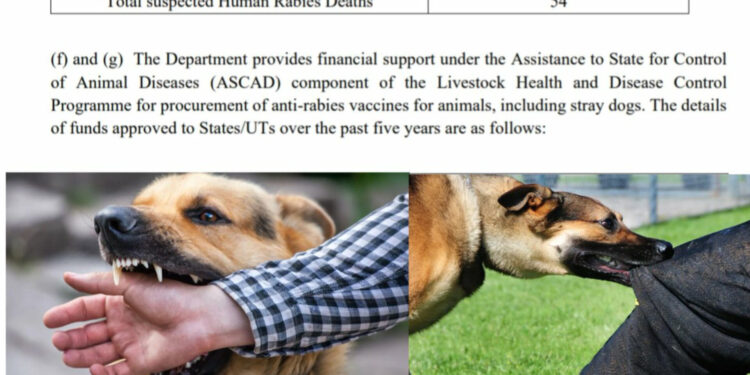New Delhi, July 24, 2025 – India faced a significant public health challenge in 2024, with the National Centre for Disease Control (NCDC) reporting a staggering 3,717,336 dog bite cases and 54 suspected human rabies deaths across the country, according to data presented in the Lok Sabha on Tuesday.
In a written response to a parliamentary query, Minister of State for Fisheries, Animal Husbandry, and Dairying S.P. Singh Baghel highlighted the scale of the issue, noting that the data was collected under the National Rabies Control Programme (NRCP) from states and Union Territories. The figures underscore the persistent threat posed by stray dogs and the urgent need for effective rabies prevention measures.
The NCDC data indicates that dog bites remain a major public health concern, with approximately 519,704 cases involving children under 15, accounting for 20% of the total incidents. Karnataka emerged as a hotspot, reporting 361,522 dog bite cases and 42 suspected rabies deaths, with Bengaluru Urban recording the highest number of fatalities at 16. A 2024 study published in The Lancet estimates that India accounts for 36% of global rabies deaths, with around 5,726 fatalities annually, largely due to inadequate post-bite care, as 20.5% of victims receive no anti-rabies vaccine.
To address the stray dog population, the Indian government has implemented the Animal Birth Control (ABC) Programme, which focuses on sterilization and anti-rabies vaccination of stray dogs. The Centre has also notified the ABC Rules, 2023, under the Prevention of Cruelty to Animals Act, 1960, to promote humane population control. Municipalities, tasked with managing stray dogs, are supported by financial assistance under the Livestock Health and Disease Control Programme for procuring anti-rabies vaccines.
The Animal Welfare Board of India (AWBI) has issued 166 advisories and letters between 2024 and June 2025 to address complaints related to community animal feeding, urging local bodies and resident associations to take appropriate action. In November 2024, the Ministry of Fisheries, Animal Husbandry, and Dairying issued an advisory to states, emphasizing the implementation of the ABC Programme to enhance public safety, particularly for children.
Congress MP Karti Chidambaram raised alarm over the crisis, stating on social media, “We can’t ignore this anymore! Street dogs,” reflecting growing public concern. States like Karnataka and Kerala have taken proactive measures. Karnataka’s capital, Bengaluru, has launched a 2.88 crore initiative to feed approximately 4,000 stray dogs to facilitate their capture for sterilization and vaccination. Kerala has announced plans for mobile sterilization units across 152 blocks and approved euthanasia for severely ill stray animals, alongside a statewide rabies awareness campaign in schools starting June 30, 2025.
Despite these efforts, India’s goal of becoming rabies-free by 2030 remains challenging. The NRCP includes initiatives like Model Anti-Rabies Clinics and a rabies helpline (15400) operational in five states, alongside training 119,000 medical staff between 2019 and 2023. However, experts emphasize the need for improved surveillance, timely post-exposure prophylaxis (PEP), and increased public awareness to curb the rising tide of dog bites and rabies deaths.
As the stray dog menace continues to pose a deadly threat, calls for coordinated action across states are intensifying, with lawmakers and citizens urging stronger policies and infrastructure to balance public safety and animal welfare.
Sources: Data from the National Centre for Disease Control (NCDC), Lok Sabha statement by Minister S.P. Singh Baghel.







































